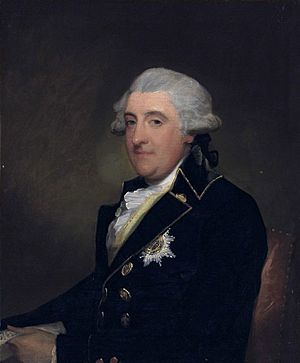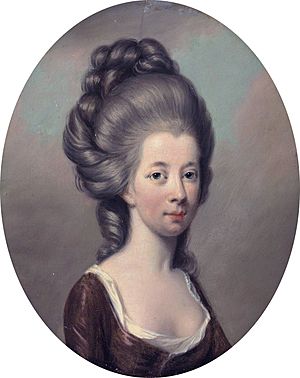William FitzGerald, 2nd Duke of Leinster facts for kids
Quick facts for kids
The Duke of Leinster
KP PC (Ire)
|
|
|---|---|

The Duke of Leinster, by Gilbert Stuart
|
|
| Master of the Rolls in Ireland | |
| In office 1788–1789 |
|
| Preceded by | Richard Rigby |
| Succeeded by | |
| Clerk of the Crown in Ireland | |
| In office 1795–1797 |
|
| Preceded by | Sir Lucius O'Brien |
| Succeeded by | Lord Glentworth |
| Member of Parliament for Dublin City | |
| In office 1767–1773 |
|
| Member of Parliament for Kildare Borough | |
| In office 1768–1769 |
|
| Personal details | |
| Born | 12 March 1749 London, Great Britain |
| Died | October 20, 1804 (aged 55) Carton, Ireland |
| Spouse |
Emilia Olivia St George
(m. 1775; died 1798) |
| Children |
|
| Parents |
|
| Military service | |
| Allegiance | |
| Branch/service | Volunteers |
| Rank | Colonel |
| Unit | |
William Robert FitzGerald, 2nd Duke of Leinster (born March 12, 1749 – died October 20, 1804) was an important Irish leader and landowner. He was born in London, Great Britain. As the Duke of Leinster, he held a high rank in Irish society.
Contents
Life as a Leader and Landowner
William Robert FitzGerald started his public life early. Between 1768 and 1769, he went on a "Grand Tour." This was a long trip around Europe that young noblemen often took to learn about art and culture.
Early Political Roles
During his Grand Tour, FitzGerald also served as a Member of Parliament (MP). An MP is someone elected to represent people in the government. He represented Kildare Borough.
Later, he became an MP for Dublin City. He served in the Irish House of Commons, which was like the parliament for Ireland at the time. In 1773, he became the Duke of Leinster after his father passed away. This meant he inherited his father's important title and large land estates.
Supporting Irish Rights
FitzGerald was a "liberal politician." This means he believed in more freedom and rights for people. He supported Henry Grattan, another Irish leader. Grattan's group, the Irish Patriot Party, wanted Ireland to have more control over its own laws.
In 1789, FitzGerald helped start the Irish Whig Club. This group also worked for more rights for Irish people. He was quite influential and had a say in who became MPs from the Kildare area.
Military and Other Roles
In 1779, FitzGerald was chosen as a Colonel. He led the Dublin Regiment of the Irish Volunteers. These were groups of armed citizens who helped protect Ireland.
He also held important positions outside of politics. From 1770 to 1772, and again in 1777, he was the Grandmaster of the Grand Lodge of Ireland. This was a leading role in a well-known social organization called the Freemasons. In 1783, he was one of the first knights of the new Order of St. Patrick. This was a special award given for service to Ireland.
Helping the Community
FitzGerald strongly supported "Catholic emancipation." This was the idea that Catholics in Ireland should have the same rights as Protestants. In 1795, he donated land to help start St. Patrick's College Maynooth. This college was a seminary, a place where people could study to become Catholic priests.
He also invested in the Royal Canal company in 1790. Canals were important waterways for moving goods and people. He even helped rebuild the main bridge in Athy over the River Barrow.
Family Life
William Robert FitzGerald was the second son of James FitzGerald, 1st Duke of Leinster. His mother was Lady Emily Lennox. He was also the older brother of Lord Edward FitzGerald, who was involved in a rebellion in the 1790s.
On November 4 or 7, 1775, he married Emilia Olivia Usher St George. She was the daughter of The 1st Baron Saint George. They had several children together:
- Lady Mary Rebecca FitzGerald (1777–1842)
- Lady Emily Elizabeth FitzGerald (1778–1856)
- Lady Elizabeth FitzGerald (1780–1857)
- George FitzGerald, Marquess of Kildare (1783–1784)
- Lady Cecilia Olivia Geraldine FitzGerald (1786–1863)
- Lady Olivia Letitia Catherine FitzGerald (1787–1858)
- Augustus FitzGerald, 3rd Duke of Leinster (1791–1874)
- Lord William Charles O'Brien FitzGerald (1793–1864)
- Lady Isabella Charlotte FitzGerald (died 1868)
Homes and Estates
The Duke of Leinster had several important homes. He lived at Carton House and Kilkea Castle in County Kildare. He also had Leinster House in Dublin, which is now where the Irish parliament meets.
His family owned a very large amount of land, about 60,000 acres (25,000 hectares). This land was mainly in three areas around Maynooth, Rathangan, and Athy.
See also
- Duke of Leinster
 | DeHart Hubbard |
 | Wilma Rudolph |
 | Jesse Owens |
 | Jackie Joyner-Kersee |
 | Major Taylor |


